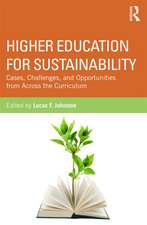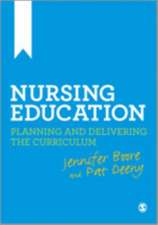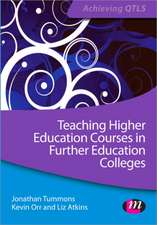University Rankings: Theoretical Basis, Methodology and Impacts on Global Higher Education: The Changing Academy – The Changing Academic Profession in International Comparative Perspective, cartea 3
Editat de Jung Cheol Shin, Robert K. Toutkoushian, Ulrich Teichleren Limba Engleză Paperback – 3 aug 2013
| Toate formatele și edițiile | Preț | Express |
|---|---|---|
| Paperback (1) | 640.06 lei 6-8 săpt. | |
| SPRINGER NETHERLANDS – 3 aug 2013 | 640.06 lei 6-8 săpt. | |
| Hardback (1) | 646.30 lei 6-8 săpt. | |
| SPRINGER NETHERLANDS – 8 iun 2011 | 646.30 lei 6-8 săpt. |
Din seria The Changing Academy – The Changing Academic Profession in International Comparative Perspective
- 15%
 Preț: 645.47 lei
Preț: 645.47 lei - 20%
 Preț: 572.65 lei
Preț: 572.65 lei -
 Preț: 394.51 lei
Preț: 394.51 lei -
 Preț: 391.22 lei
Preț: 391.22 lei - 20%
 Preț: 568.43 lei
Preț: 568.43 lei -
 Preț: 398.35 lei
Preț: 398.35 lei - 15%
 Preț: 657.08 lei
Preț: 657.08 lei - 15%
 Preț: 652.49 lei
Preț: 652.49 lei - 18%
 Preț: 952.72 lei
Preț: 952.72 lei - 20%
 Preț: 575.38 lei
Preț: 575.38 lei - 15%
 Preț: 643.48 lei
Preț: 643.48 lei - 18%
 Preț: 949.90 lei
Preț: 949.90 lei -
 Preț: 390.84 lei
Preț: 390.84 lei - 18%
 Preț: 778.94 lei
Preț: 778.94 lei - 24%
 Preț: 810.75 lei
Preț: 810.75 lei - 18%
 Preț: 942.76 lei
Preț: 942.76 lei - 18%
 Preț: 948.16 lei
Preț: 948.16 lei - 15%
 Preț: 642.51 lei
Preț: 642.51 lei - 15%
 Preț: 636.63 lei
Preț: 636.63 lei - 20%
 Preț: 562.28 lei
Preț: 562.28 lei - 15%
 Preț: 646.30 lei
Preț: 646.30 lei - 20%
 Preț: 572.08 lei
Preț: 572.08 lei - 15%
 Preț: 653.46 lei
Preț: 653.46 lei
Preț: 640.06 lei
Preț vechi: 753.01 lei
-15% Nou
Puncte Express: 960
Preț estimativ în valută:
122.49€ • 126.91$ • 102.23£
122.49€ • 126.91$ • 102.23£
Carte tipărită la comandă
Livrare economică 22 martie-05 aprilie
Preluare comenzi: 021 569.72.76
Specificații
ISBN-13: 9789400736443
ISBN-10: 9400736444
Pagini: 288
Ilustrații: XIV, 274 p.
Dimensiuni: 155 x 235 x 15 mm
Greutate: 0.41 kg
Ediția:2011
Editura: SPRINGER NETHERLANDS
Colecția Springer
Seria The Changing Academy – The Changing Academic Profession in International Comparative Perspective
Locul publicării:Dordrecht, Netherlands
ISBN-10: 9400736444
Pagini: 288
Ilustrații: XIV, 274 p.
Dimensiuni: 155 x 235 x 15 mm
Greutate: 0.41 kg
Ediția:2011
Editura: SPRINGER NETHERLANDS
Colecția Springer
Seria The Changing Academy – The Changing Academic Profession in International Comparative Perspective
Locul publicării:Dordrecht, Netherlands
Public țintă
ResearchCuprins
Preface.- Contributors.- 1. The Past, Present, and Future of University Rankings; Jung Cheol SHIN and Robert K. TOUTKOUSHIAN.- PART A. Organizational Effectiveness, Quality, and Rankings.- 2. Organizational Effectiveness and University Rankings; Jung Cheol SHIN.- 3. Competitors of Rankings: New Directions in Quality Assurance and Accountability; Grant HARMAN.- 4. The Social Contexts and Systemic Consequence of University Rankings: A Meta-Analysis of the Ranking Literature; Ulrich TEICHLER.- PART B. Methodological Issues of University Rankings.- 5. Methodological Issues: Indicators and Weights; Bernard LONGDEN.- 6. Measures of Faculty Productivity; Karen WEBBER.- 7. Issues in Measuring the Research Performance of Postsecondary Institutions; RobertK. TOUTKOUSHIAN and Karen WEBBER.- 8. Peer Review and Bibliometric Indicators: Potentials and Problems; Lutz BORNMANN.- 9. Measuring Teaching Performance; Keith TRIGWELL.- PART C. Social Impacts of University Rankings.- 10. On the Efficacy of Raising Your University’s Rankings; Christopher MORPHEW and Christopher SWANSON.- 11. The Institutionalization of Rankings: Managing Status Anxiety in an Increasingly Marketized Environment; William LOCKE.- 12. Reaction to Academic Ranking: Knowledge Production, Faculty Productivity from an International Perspective; Akira ARIMOTO.- 13: The Future ofUniversity Rankings; Ulrich TEICHLER.- Index.
Recenzii
“This is the best book going on university rankings. It provides a reliable, readable, wide-ranging guide for the policy maker, university leader, scholar and would be doctoral student who wants to make sense of the mass of ranking data now available. Shin, Toutkoushian and Teichler tell us how to sort the good, the bad and the ugly in university comparison. A strength of the book, one that guarantees its broad relevance, is the inclusion of contributions from each of the world’s major zones of higher education.”
Simon Marginson, Professor, University of Melbourne
“This volume makes an impressive contribution to our understanding of the international obsession with university rankings. Shin, Toutkoushian, and Teichler, along with their contributing authors, examine the topic from multiple perspectives that will appeal to administrators, scholars, and public audiences alike. Grounded in organizational theory, the volume sheds light on the many ranking methodologies ranging from simplistic and descriptive to intricate and multivariate. Not only do several chapters illuminate the relevant measurement issues, but other chapters address the social impact of the rankings themselves and how they influence university behavior. No other book combines such a rich collection of international perspectives and so effectively fills a gap in the literature.”
James Fredericks Volkwein, Professor, Pennsylvania State University
“This book offers a comprehensive and very timely analysis of a topic of central importance to contemporary higher education: university rankings. Contributors to the book provide a key to the understanding of the theoretical basis and methodological foundations of rankings and their impact on higher education systems and institutions. Illuminating the amazing popularity of rankings, broad and refreshing reflection on the drivers and consequences of rankings areoffered.”
Jürgen Enders, Professor, University of Twente
“Since the rankings and indicators of universities are proliferating, this book appears in due time for generating some overview of the field. Do the rankings measure efficiency (in terms of output/input) or effectiveness (in terms of stated goals)? Is one comparing apples with oranges? For example, since mathematicians provide fewer references than molecular biologists, would a university be well advised to close its mathematics department? Would Harvard still be at the top of the list if publications/dollar were used for the ranking? These and such questions require further reflection. The authors have done a commendable job in organizing the state of the art.”
Loet Leydesdorff, Professor, University of Amsterdam
…” Though not all aspects covered in the book are new, the 13 scholar—contributors to this book, make it a good reading on what is becoming an increasingly important issue, for the graduate students and policy‐makers as well.”
Jandhyala B.G. Tilak, National University of Educational Planning and Administration, New Delhi, India
Journal of Educational Planning and Administration
Volume XXVII, No. 2, April 2013, pp. 209‐224
http://www.nuepa.org/Pub_Jepa.html
Simon Marginson, Professor, University of Melbourne
“This volume makes an impressive contribution to our understanding of the international obsession with university rankings. Shin, Toutkoushian, and Teichler, along with their contributing authors, examine the topic from multiple perspectives that will appeal to administrators, scholars, and public audiences alike. Grounded in organizational theory, the volume sheds light on the many ranking methodologies ranging from simplistic and descriptive to intricate and multivariate. Not only do several chapters illuminate the relevant measurement issues, but other chapters address the social impact of the rankings themselves and how they influence university behavior. No other book combines such a rich collection of international perspectives and so effectively fills a gap in the literature.”
James Fredericks Volkwein, Professor, Pennsylvania State University
“This book offers a comprehensive and very timely analysis of a topic of central importance to contemporary higher education: university rankings. Contributors to the book provide a key to the understanding of the theoretical basis and methodological foundations of rankings and their impact on higher education systems and institutions. Illuminating the amazing popularity of rankings, broad and refreshing reflection on the drivers and consequences of rankings areoffered.”
Jürgen Enders, Professor, University of Twente
“Since the rankings and indicators of universities are proliferating, this book appears in due time for generating some overview of the field. Do the rankings measure efficiency (in terms of output/input) or effectiveness (in terms of stated goals)? Is one comparing apples with oranges? For example, since mathematicians provide fewer references than molecular biologists, would a university be well advised to close its mathematics department? Would Harvard still be at the top of the list if publications/dollar were used for the ranking? These and such questions require further reflection. The authors have done a commendable job in organizing the state of the art.”
Loet Leydesdorff, Professor, University of Amsterdam
…” Though not all aspects covered in the book are new, the 13 scholar—contributors to this book, make it a good reading on what is becoming an increasingly important issue, for the graduate students and policy‐makers as well.”
Jandhyala B.G. Tilak, National University of Educational Planning and Administration, New Delhi, India
Journal of Educational Planning and Administration
Volume XXVII, No. 2, April 2013, pp. 209‐224
http://www.nuepa.org/Pub_Jepa.html
Textul de pe ultima copertă
This ground-breaking and exhaustive analysis of university ranking surveys scrutinizes their theoretical bases, methodological issues, societal impact, and policy implications, providing readers with a deep understanding of these controversial comparators. The authors propose that university rankings are misused by policymakers and institutional leaders alike. They assert that these interested parties overlook the highly problematic internal logic of ranking methodologies even as they obsess over the surveys’ assessment of their status. The result is that institutions suffer from short-termism, realigning their resources to maximize their relative rankings. While rankings are widely used in policy and academic discussions, this is the first book to explore the theoretical and methodological issues of ranking itself. It is a welcome contribution to an often highly charged debate. Far from showing how to manipulate the system, this collection of work by key researchers aims to enlighten interested parties.
“This is the best book going on university rankings. It provides a reliable, readable, wide-ranging guide for the policy maker, university leader, scholar and would be doctoral student who wants to make sense of the mass of ranking data now available. Shin, Toutkoushian and Teichler tell us how to sort the good, the bad and the ugly in university comparison. A strength of the book, one that guarantees its broad relevance, is the inclusion of contributions from each of the world’s major zones of higher education.”
Simon Marginson, Professor, University of Melbourne
"This book offers a comprehensive and very timely analysis of a topic of central importance to contemporary higher education: university rankings. Contributors to the book provide a key to the understanding of the theoretical basis and methodological foundations of rankings and their impact on higher education systems and institutions. Illuminating theamazing popularity of rankings, broad and refreshing reflection on the drivers and consequences of rankings are offered.”
Jürgen Enders, Professor, University of Twente
“This is the best book going on university rankings. It provides a reliable, readable, wide-ranging guide for the policy maker, university leader, scholar and would be doctoral student who wants to make sense of the mass of ranking data now available. Shin, Toutkoushian and Teichler tell us how to sort the good, the bad and the ugly in university comparison. A strength of the book, one that guarantees its broad relevance, is the inclusion of contributions from each of the world’s major zones of higher education.”
Simon Marginson, Professor, University of Melbourne
"This book offers a comprehensive and very timely analysis of a topic of central importance to contemporary higher education: university rankings. Contributors to the book provide a key to the understanding of the theoretical basis and methodological foundations of rankings and their impact on higher education systems and institutions. Illuminating theamazing popularity of rankings, broad and refreshing reflection on the drivers and consequences of rankings are offered.”
Jürgen Enders, Professor, University of Twente
Caracteristici
First book to comprehensively deal with the subject Ground-breaking detail on the theory, methodology and social impacts of university ranking schemes Focuses on enhancing users’ understanding of the surveys Covers the social impact of ranking systems within university institutions, including their impact on campus life












